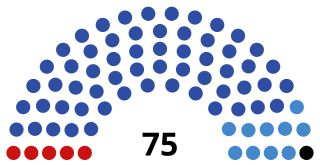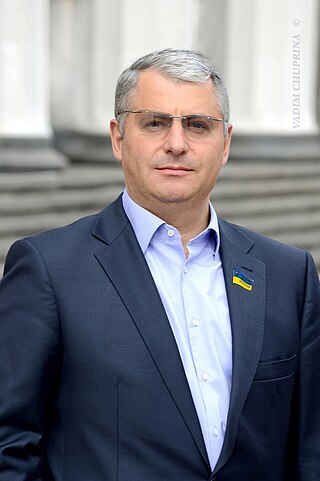
The Verkhovna Rada of Ukraine, often simply Verkhovna Rada or just Rada, is the unicameral parliament of Ukraine. The Verkhovna Rada is composed of 450 deputies, who are presided over by a (speaker). The Verkhovna Rada meets in the Verkhovna Rada building in Ukraine's capital Kyiv. The deputies elected on 21 July 2019 Ukrainian parliamentary election were inaugurated on 29 August 2019.
The judicial system of Ukraine is outlined in the 1996 Constitution of Ukraine. Before this there was no notion of judicial review nor any Supreme court since 1991's Ukrainian independence when it started being slowly restructured.
The Cabinet of Ministers of Ukraine, commonly referred to as the Government of Ukraine, is the highest body of state executive power in Ukraine. As the Council of Ministers of the Ukrainian SSR, it was formed on 18 April 1991, by the Law of Ukrainian SSR No.980-XII. Vitold Fokin was approved as the first Prime Minister of Ukraine.

The State Council of Crimea is the parliament of Russian administered Republic of Crimea. It claims to be a continuation of the 'Supreme Council of Crimea' following a vote by the Ukrainian parliament to dissolve the Supreme Council of Crimea. The Parliament is housed in the Parliament building in the centre of Simferopol.
The political crisis in Ukraine lasted from April to June 2007 was part of political stand off between coalition and opposition factions of Verkhovna Rada that led to the unscheduled 2007 Ukrainian parliamentary election. It started on 2 April 2007 as a culmination of long lasting crisis and degradation of the parliamentary coalition when the President of Ukraine attempted to dissolve the parliament.
The politics of Crimea today is that of the Republic of Crimea on one hand, and that of the federal city of Sevastopol on the other, within the context of the largely unrecognised annexation of Crimea by the Russian Federation in March 2014.
The legal system of Ukraine is based on the framework of civil law, and belongs to the Romano-Germanic legal tradition. The main source of legal information is codified law. Customary law and case law are not as common, though case law is often used in support of the written law, as in many other legal systems. Historically, the Ukrainian legal system is primarily influenced by the French civil code, Roman Law, and traditional Ukrainian customary law. The new civil law books were heavily influenced by the German Bürgerliches Gesetzbuch.

Oleksandr Volodymyrovych Lavrynovych is a Ukrainian physicist, lawyer, politician, former member of the Supreme Council of Justice of Ukraine, a former Ukrainian member of parliament and former Minister of Justice of Ukraine. He is a Merited Jurist of Ukraine (2003). He was one of the founders of the first democratic party in Ukraine in 1989 – People's Movement of Ukraine and considered to be one of the "fathers" of the independence of Ukraine from the Soviet Union.
The High Council of Justice, or sometimes the Supreme Council of Justice is the national council of the judiciary of Ukraine, which submits motions to appoint, dismisses and disciplines judges. In 2021, the Ethics Council was created with the intention of selecting the members of the High Council of Justice in a way that would help to create an independent and efficient judiciary in Ukraine.
Language policy in Ukraine is based on its Constitution, international treaties and on domestic legislation. According to article 10 of the Constitution, Ukrainian is the official language of Ukraine, and the state shall ensure the comprehensive development and functioning of the Ukrainian language in all spheres of social life throughout the entire territory of the country. Some minority languages have significantly less protection, and have restrictions on their public usage.

The Verkhovna Rada of Ukraine of the 8th convocation was a convocation of the legislative branch of the Verkhovna Rada, Ukraine's unicameral parliament. The 8th convocation met at the Verkhovna Rada building in Kyiv, having begun its term on 27 November 2014 following the last session of the 7th Verkhovna Rada. Its five-year term came to an end on July 24, 2019, marking the end of its tenth session.

The Centre of Policy and Legal Reform is a Ukrainian non-governmental think tank founded in 1996.

Olena Serhijivna Sotnyk is a Ukrainian lawyer and politician, former Member of the Parliament of Ukraine from Samopomich ("Self-Reliance") Party. She was the secretary of the Verkhovna Rada Committee on European integration; Sotnyk served as a Head of the Sub-committee on Approximation of Ukrainian Legislation to the EU Law. Shed co-chaired the Inter-Parliamentary Relations Unit with Belgium. She was Chairman of the Committee on Legal Affairs and Human Rights at the PACE, a member of the Bureau of Women's Parliamentarians in the Inter-Parliamentary Union and a vice-president of political group the Alliance of Liberals and Democrats for Europe in the PACE. Sotnyk was the first female to represent Ukraine in the Yale World Fellows Program. She was one of the most successful women of Ukraine in 2019 according to the "New Time" and "Legal Newspaper".

Roman Romanuk is a Ukrainian politician. People's Deputy of Ukraine of the VII, VIIIth convocation.

Galyna Mykhailiuk is a Ukrainian lawyer and politician currently serving as a People's Deputy of Ukraine as the 46th member of the party list of Servant of the People. As Member of Parliament, she holds a position of the Deputy Head of the Committee on Law Enforcement and Co-Head of the Verkhovna Rada of Ukraine Groups on Interparliamentary Relations with Japan and Australia.
Judicial reform in Ukraine is a set of legislative, institutional and personnel changes aimed at improving the Judiciary of Ukraine.

The Ukrainian Ethics Council is a legal body of three Ukrainian and three international members created in 2021 to appoint members of the High Council of Justice. Anti-corruption organisations AutoMaidan, Dejure, and Anti-Corruption Action Center criticised the council's June 2022 appointments as including "tainted" judges and for refusing a well-known anti-corruption judge and whistleblower, Larysa Golnyk.

Andriy Yevhenovych Kostin is a Ukrainian lawyer and politician. As of 2022, he is a People's Deputy of Ukraine since he was elected to it 2019. Kostin was a candidate in the 2021 competition to become the new head of the Ukrainian Specialized Anti-Corruption Prosecutor's Office (SAPO). Civil society organisations Transparency International Ukraine, Automaidan, Anti-Corruption Action Center and Dejure stated that Kostin did not satisfy the integrity criteria of the competition. Kostin was not selected. Kostin was the Head of the Verkhovna Rada Legal Policy Committee for two years, from 2020 to 2022. On 27 July 2022, Kostin was voted by the Verkhovna Rada as the Prosecutor General of Ukraine.
Dejure Foundation or Dejure, created in 2016, is a Ukrainian non-governmental organisation that promotes judicial reform in Ukraine. Dejure analyses judges' integrity based on their records and monitors legal developments related to the judiciary of Ukraine.

Olha Mykhailivna Vasylevska-Smahliuk Ukrainian journalist, Member of Parliament of Ukraine of the 9th convocation, elected from the 96th single-mandate constituency, member of the Parliamentary faction of Servants of the People, Chair of the Subcommittee on the Functioning of Payment and Information Systems and Prevention of Money Laundering of the Verkhovna Rada Committee on Finance, Tax and Customs Policy.










